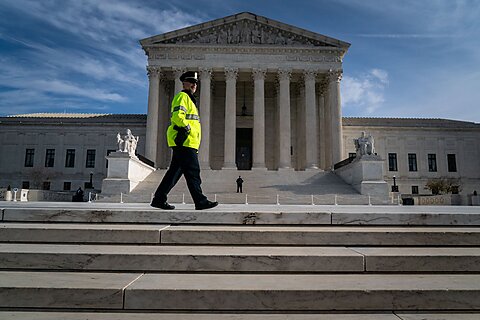Clark Neily
The Constitution has a variety of countermajoritarian structures and provisions, some of which the Supreme Court enforces vigorously, some of which it enforces sparingly, and some of which it has rendered functionally meaningless through judicial abdication. On March 4, the justices consigned to the latter category Section 3 of the Fourteenth Amendment, which states that “no person” may hold public office who, having sworn an oath to support the United States, engages in insurrection.
The decision—or, more precisely, its rationale—was quickly condemned by various commentators, including Ilya Somin, David French, and Michael Rappaport, among others. The essence of those critiques is that the justices made an extraordinary claim—namely, that Section 3 only applies to a given insurrectionist if Congress specifically says so—without providing extraordinary evidence or argument to support that claim.
I strongly agree that the court’s reasoning in Trump v. Anderson was both exceptionally unpersuasive and more consequentialist than originalist. Moreover, I expect that the per curiam opinion’s analytical shortcomings will become even more clear as scholars continue to reflect on its reasoning and implications. But instead of taking yet another swipe at the justices’ ends‐oriented rationalizations, it’s worth noting how familiar the decision felt to judicial‐engagement favoring libertarians—a case of “déjà vu all over again,” as Yogi Berra might say.
If you asked a bunch of Constitution‐loving classical liberals to name the worst, most momentous, and jurisprudentially indefensible Supreme Court decisions of all time, chances are two cases would be at or near the top of most lists: Wickard v. Filburn (1942), and the Slaughter‐House Cases (1873).
The reason so many libertarians so revile Wickard and Slaughter‐House is that those decisions respectively gutted the Constitution’s two most important protections of individual liberty. Wickard, which famously asked whether the federal government could micromanage a farmer’s entirely local, noncommercial production of wheat under Congress’s power “to regulate commerce…among the several states,” marked the functional end of enumerated federal powers and any serious effort to respect the Tenth Amendment’s command that powers not delegated to the United States be reserved to the states or the people.
As a result, we went from a world in which almost nothing that individuals do was any business of the federal government to a world in which virtually everything people do falls under the suzerainty of multiple federal bureaucrats.
What violence Wickard did to enumerated powers, Slaughter‐House did to unenumerated rights by transforming the Fourteenth Amendment’s sweeping command that no state shall “abridge the privileges or immunities of citizens” into a sophomoric assurance that people have proper access to federal seaports, subtreasuries, and land offices, as well as the ability to claim the protection of the federal government when on the high seas—matters that had precisely zero connection to the drafting and ratification of the Fourteenth Amendment or Congress’s goal of ensuring equality and freedom from tyrannical state governments.
Unfortunately for liberty and limited government, the Supreme Court’s cop‐outs in Wickard and Slaughter‐House continue to exert their doleful influence today. Thus, for example, in Gonzalez v. Raich (2005), the Supreme Court held that Congress’s power to regulate commerce among the states includes the authority to criminalize the purely local cultivation and noncommercial distribution of a plant (cannabis), thus ensuring that the federal government may continue waging its brutal, ineffective, and endlessly criminogenic war on drugs.
Similarly, the court’s failure to interpret the Fourteenth Amendment’s Privileges or Immunities Clause consistent with text, history, and tradition means that countless unenumerated rights such as occupational freedom receive no meaningful judicial protection. The result is a haphazard jurisprudence of liberty in which some plainly fundamental rights are protected (such as the right to guide the upbringing of one’s children and even the right of prisoners to get married), while others—including access to potentially lifesaving drugs for terminally ill cancer patients—are not.
Sadly, there is nothing new in Anderson’s decision to pass the buck to Congress for enforcing Section 3’s bar against insurrectionists holding federal office, and the justices’ inability to articulate any truly persuasive rationale for doing so is a familiar hallmark of the Supreme Court’s kick‐the‐can jurisprudence of constitutional abdication.
Here’s a final point for those who snidely suggest that Anderson’s purported unanimity provides some measure of assurance against error: Wickard too was unanimous, and it represented the death knell of the Constitution’s single greatest protection against overweening federal power. Moreover, if we think of Anderson as an 8–1 decision, as it appears it very nearly was, then it joins a veritable rogue’s gallery of illegitimately government‐empowering cases that all but one justice got wrong:
Plessy v. Ferguson (embracing the infamous “separate but equal” doctrine for racial segregation)—overruled unanimously by Brown v. Board of Education
Bradwell v. Illinois (upholding state ban on female lawyers)—overruled implicitly by subsequent equal‐protection cases, including Craig v. Boren
Buck v. Bell (upholding eugenic sterilization)—overruled implicitly and unanimously by Skinner v. Oklahoma
Minersville School District v. Gobitis (upholding mandatory flag salute)—overruled by West Virginia State Board of Educ. v. Barnette
Harlow v. Fitzgerald (inventing doctrine of qualified immunity from whole cloth)—not yet overruled, but we’re working on it
Those who wrote and ratified the Fourteenth Amendment well understood the evils of insurrection and the importance of denying public office to miscreants who defy legal norms in the pursuit of political power. The Supreme Court’s bowdlerizing of their handiwork in Trump v. Anderson is disappointing—yet disappointingly familiar.

